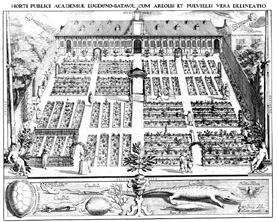
4 minute read
History
from About us 2021
An illustrious history
Leiden University is the oldest university in the Netherlands. It was founded on 8 February 1575 in Leiden’s Pieterskerk church. This was at the time of the Eighty Years’ War, the uprising by the northern provinces against Spanish rule. Throughout the University’s entire 446year history, innovation has remained a firm tradition.
Rembrandt
World-famous Dutch painter Rembrandt van Rijn studied at Leiden University. He enrolled as a student of the arts, and later painted famous Leiden alumni such as Marten Soolmans, Jan Six and Nicolaes Tulp.
Leiden Observatory

Astronomy has a long and rich tradition in Leiden. The University acquired an observatory on the roof of the Academy Building as early as 1633. The Old Observatory was completed in 1861. This is still used for teaching, but the astronomers now work on the Science Campus.
1575 Foundation
Leiden University was founded by William of Orange in 1575. Legend has it that he founded the University to reward the city for its resistance to the Spanish.
Charter of Leiden University from 1575.
1581
Academy Building
The Academy Building on the Rapenburg canal is Leiden University’s oldest building. It came into the University’s possession in 1581, and is used for ceremonies such as graduations, inaugural lectures and PhD defences.
1600 1620
First tulip
Carolus Clusius brought the first tulips to Leiden at the end of the 16th century. The bulbs originally came from Turkey. Clusius cultivated all sorts of new varieties in the Hortus botanicus. His research formed the basis of today’s bulb industry in the Netherlands. Hundreds of years later, his influence is still visible in the bulb fields between Leiden and Haarlem.

The Clusius garden in the Hortus botanicus in around 1601.
1633 1714 Boerhaave
Herman Boerhaave inspired a revolution in the medical world: he put the patient first. In 1714, this Leiden professor introduced lessons at the patient’s bedside. He transformed medicine from a theoretical to a practical, exploratory field.

Kamerlingh Onnes
In his cryogenics laboratory, Heike Kamerlingh Onnes succeeded in achieving the exceedingly low temperature of four degrees above absolute zero, the temperature at which helium becomes liquid. Nothing can be colder than absolute zero (-273.15 degrees Celsius) because atoms and molecules then stop moving. This earned the Leiden lab the epithet of, ‘the coldest place on earth’. The building in the centre of Leiden that now houses Leiden Law School is named after Kamerlingh Onnes.
First female professor
Sophia Antoniadis (1895-1972) was the first female professor at Leiden University. She was professor of medieval and modern Greek from 1929 to 1955. In 2020, almost 30 percent of the University’s professors were women.
King Willem-Alexander graduates

King Willem-Alexander graduated in history in 1993, following in the footsteps of his mother, Princess Beatrix, and grandmother, Princess Juliana, who also studied in Leiden. The photo shows him being congratulated by his mother.
Honorary doctorate for Nelson Mandela
The University awarded Nelson Mandela an honorary doctorate in 1999 in recognition of his great service to society as an antiApartheid activist (while serving a long prison sentence) and later president of South Africa.
Coronavirus
The coronavirus pandemic meant that our students followed online classes and our staff worked from home.
1820 1908 1911
Von Siebold
It is thanks to German physician Philipp Franz von Siebold (17961866) that the University has become a centre of expertise in Asian history and culture. He was also very important to botany: he lived in Japan in the 1820s and brought over 730 plant species to Europe.
Einstein
Albert Einstein was professor by special appointment at Leiden University and spent a lot of time in Leiden, where he was able to put his ground-breaking ideas to the critical minds of his Dutch friends such as Hendrik Lorentz.
1929 1938 1940 1993
Surinamese Rector
Surinamese Professor of Tropical Hygiene, Paul Christiaan Flu, became Rector Magnificus in 1938. Flu was held at Camp Vught together with Professor Rudolph Cleveringa during the Second World War.
Cleveringa gives protest speech
The German administration closed Leiden University at the beginning of the Second World War. This was in response to a speech by Professor of Law Rudolph Cleveringa protesting the dismissal of his Jewish colleagues. He lived by the University motto: Bastion of Freedom.
1999 2020
Campus The Hague opens
Leiden University opened its Campus The Hague in 1999. The research and teaching there closely reflect the themes of this city: peace, justice and security. All of the University’s faculties now teach and conduct research in The Hague.











